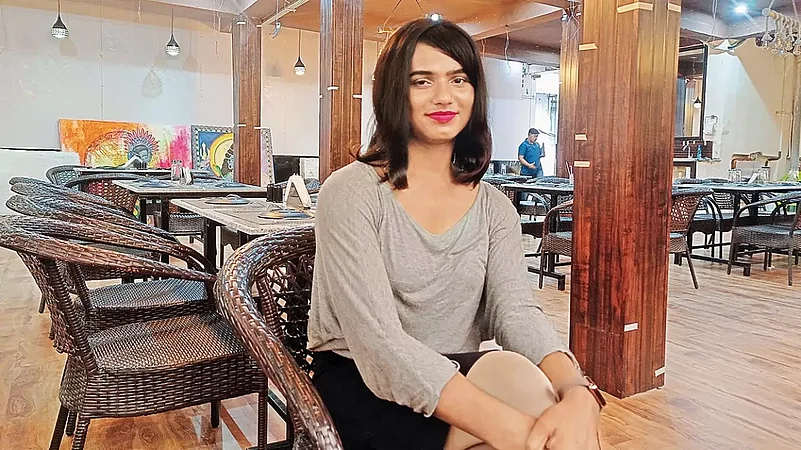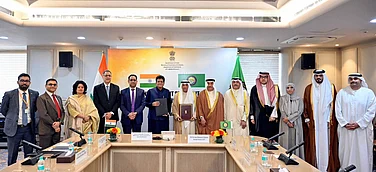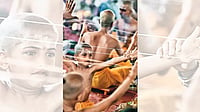“Should I wear a sari or a western dress for the Parade? I also have a performance to give. I hope I don’t mess it up,” Masoom muttered as she sat down to catch her breath. She works at Satrangi Dostana Restaurant, Bakarganj, Patna, which is run by individuals from the trans community. This community-based organisation was registered by the Bihar government in June 2021 under the 1860 Act and is supported by Patna Municipal Corporation (PMC). I met Masoom at the restaurant a day before the Pride Parade in Patna.
This Parade has been held in Bihar for the last eight years. This year, Patna Pride Parade took place in July. Dostanasafar, an NGO, was the organiser. Reshma Prasad, trans rights activist, social worker and member of the National Council for Trangender Persons is the founder secretary of Dostanasafar. A team led by Prasad organised the only Pride Parade in and of Bihar.
Sitting cross-legged at the restaurant, wearing skin-coloured stockings, a black pencil skirt, a grey top and her hair pulled up into a bun, Masoom told me her village is in Danapur, Bihar. “When I was six or seven years old I was sent to the boys’ hostel. I was a boy then. I mean, born as a boy. I felt uncomfortable at that hostel and I told my mother about it.” Masoom was then shifted to a co-ed hostel. “When I was younger and presented as a boy, people used to mock me for my body language, the way I talked. Now, I often pass as a girl, and if someone tries to bully me, I reply at once,” she said.
At 13, Suresh Yadav (the name Masoom’s biological parents gave her), realised she was not a cis man. “I came to know about myself. My father told me it is not real, what I felt.” He was not ready to accept ‘his son’ as the girl that Masoom is. Her body and her life were outrageous to her family. Her father strongly disapproved.
Masoom’s Dream has the Fragrance of Gajra
Masoom is now almost 19, a student of standard twelfth, has filled up the Bihar Police form and is preparing for the qualifying exam. Very recently, the provision of hiring one trans person for every 500 cis people has been introduced in the Bihar Police. Trans people have been clubbed under the OBC category. Many trans activists including Reshma Prasad and Grace Banu from Tamil Nadu have protested against this. They demand a vertical reservation for trans people.
Masoom’s life is centered around studying, working at the restaurant and living at Garima Griha hostel. She finds a mother figure and a guardian in Reshma Prasad. “My mother has somewhat accepted me. My father has not. I live like other girls and don’t do anything that my family should be ashamed of. I bear my own expenses by working this part-time job. I also study,” she said.

Masoom had met Reshma Prasad in Danapur three years ago. “The hostel was a few kilometres away from my home. I went to her one day and told her that my family doesn’t accept me but I have accepted myself.” With this conversation Masoom’s journey was linked to Prasad.
Masoom continued to live with her parents until she turned a major. “The hormone injections cost a thousand rupees, the price depends on many factors like which city you are in, etc. For the surgery, one needs more money. My surgery was arranged by Reshma Ma’am. At Garima Griha, we receive help from the government too,” she said.
Masoom wants to live like any ‘normal girl’. A 19-year-old who has to wear a sari and perform a classical dance piece would prefer white, fragrant gajra adorning her hair. So, she was desperate to get a string of gajra on the day of the Parade. It was raining heavily that afternoon and we walked to the local market. We could not find a natural gajra or an alternative to it. We returned with a tube of alta, a bindipatta and
green bangles.
“You look like a local model”, joked Yogi (name changed), Masoom’s friend. He works at the restaurant too.
“Yogi is my friend, my brother, my love, my everything…”
“Everything?” Yogi laughed.
Yogi is a trans man from Haryana. He looks between the age of 20 to 25. Yogi wasn’t willing to talk about his past. I could see marks of blade cuts on his arms. They looked like remnants of self-harm. His village is near Panipat and his family has cut off all contact with him.
Secret Lives or True Desire?
Arman and Anil (names changed) are nineteen and in love. In 2023, they went for the Patna Parade, their first Pride Parade so far. “We have not told our families about this. We have come here from Darbhanga,” they said. Arman and Anil met at a party and fell in love ‘at first sight’, ‘pehli nazar ka pyaar’ as they call it. “We will run away, do any kind of work but never marry a girl,” they swore. Anil explained, “I will not be able to keep the woman happy, it won’t be fair to her either.”
Their love story would have easily been named love jihad by conservative Hindu nationalists if it were a heterosexual tale of inter-faith romance.
At the Patna Parade, I also met Diwakar Bhatt (first name changed). Bhatt stays in Patna to prepare for government jobs. “I did my BA and MA from Delhi University. I came to Patna only a year ago. It feels lonely here, I don’t have many friends.”
Thirty-year-old Bhatt has no safe space to talk about how he feels about his sexuality. “I like foreplay with men. However, I’ve had sex only with women,” he said. He asked me to send him some writings in Hindi on gay sex if I have any. “If there is anyone who can meet me secretly in Patna, please let me know.” When I asked him why he wants to keep his intimate relationship details a secret, he said, “I fear society.”
I wondered if Bhatt, unlike Anil and Arman who are more aware of their desires, would settle for a heterosexual marriage. Would he succumb to societal pressure and keep living a parallel secret life like many gay men in cities like Patna do?
***
I met Ranjan (name changed) at a queer party on the evening of the 13th. He is a 30-year-old cis gay man. He was wearing a beautiful red sari and a flamboyant nose ring and was twerking to Bollywood numbers. Ranjan’s friends told me he is married. He attends such parties without revealing this part of his life or self to anyone from his family.
As many as 70 per cent of gay men in Mumbai get married before turning 30, according to a study conducted by Humsafar Trust. In two-tier cities, this percentage rises to as much as 80 per cent.
It is hard to imagine the negotiations of desires and identity that a queer or/and trans person living in a two-tier city or rural areas of Bihar has to make in order to survive. Kabir Maan, a gender educator who has worked with NGOs, the government and private schools told me, “Cis gay men enjoy some privileges of being cis men, they are at the top of the hierarchy within the LGBTQ community. In many cases, their families know about their sexuality and still go forward with marriage. Being men, they have to keep the family lineage going. I know many such gay men who live dual lives. The younger gay men like the ones you met at Patna Pride Parade embody the true meaning of Pride resistance.” He added, “I have been to the Jaipur Pride Parade and the Himachal one. In the villages in the hills, everyone knows everyone. Hence, the Himachal organisers were worried about the number of people who would turn up. However, many came. People from villages and two-tier cities of Punjab and Haryana joined in.” In 2021, Himachal Pradesh organised its first pride parade in Palampur.
“I have been regularly going to the Delhi Pride Parade. Pride is resistance which is exposed through various gender expressions, singing and sloganeering, but in Delhi, when people gather at the end to talk, to address the issue of rights and grassroot movements, very few are there to engage with it. Most people leave by that time.” Kabir is a trans man who dreams of reaching the farthest villages of India and sensitising people about gender and sexuality. “A ‘Kabir’ must be there in a village in Bihar somewhere, but how do we reach them?” Kabir’s question is also the dream that he nurses for the community.
(Views expressed are personal)
Aishwarya Raj is a philosophy student at Delhi university


















